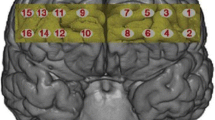Heading
Abstract
Rationale. Experimental evidence has shown that 3,4-methylenedioxymethamphetamine (MDMA, "ecstasy") can act as a serotonergic neurotoxin in laboratory animals. The serotonin system predominantly innervates frontal and limbic regions of the brain and has been associated with consolidatory learning and mnemonic processes in humans.
Objectives. The aim of the present study was to investigate the cognitive neuropsychological profile of drug-free ecstasy users by employing a selection of tasks previously associated with lesion or neurodegenerative damage to the temporal lobe or fronto-striatal regions.
Methods. The study comprised 40 participants: 20 ecstasy polydrug users and 20 polydrug users who had never taken ecstasy.
Results. Ecstasy users were significantly impaired on a recognition task for complex visual patterns and spatial working memory, as a function of task difficulty rather than systematic search strategy. They also showed a trend towards impairment on several learning paradigms. Ecstasy users remained relatively unimpaired on most measures associated with prefrontal functioning, with the exception of verbal fluency "letter" generation.
Conclusions. Initial cognitive deficits in ecstasy polydrug users may be more apparent in tasks known to be sensitive to temporal functioning.
Similar content being viewed by others
Author information
Authors and Affiliations
Additional information
Electronic Publication
Rights and permissions
About this article
Cite this article
Fox, H., McLean, A., Turner, J. et al. Neuropsychological evidence of a relatively selective profile of temporal dysfunction in drug-free MDMA ("ecstasy") polydrug users. Psychopharmacology 162, 203–214 (2002). https://doi.org/10.1007/s00213-002-1071-9
Received:
Accepted:
Published:
Issue Date:
DOI: https://doi.org/10.1007/s00213-002-1071-9




